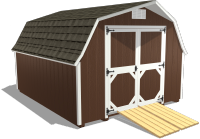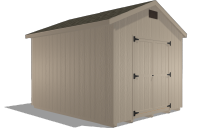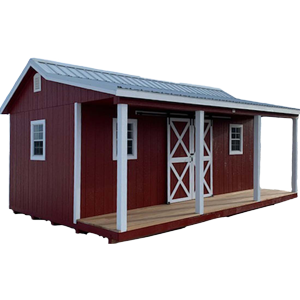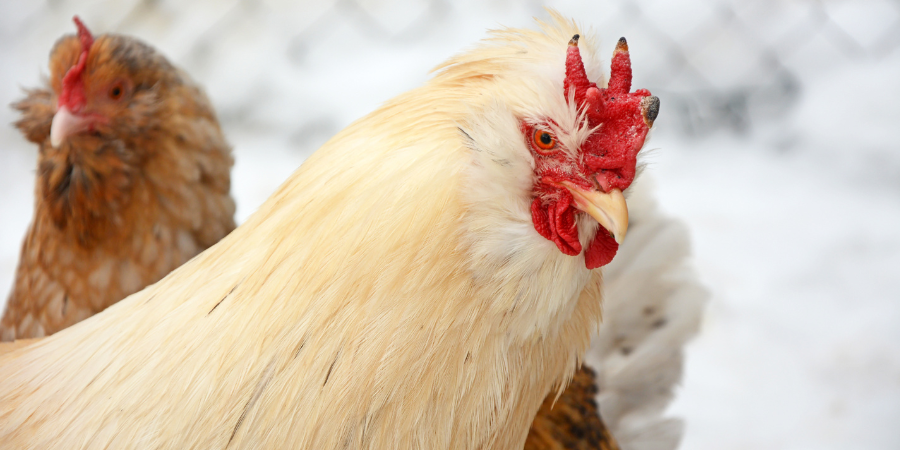Winter Chicken Care: Expert Tips for Happy and Healthy Hens
by Dakota Storage Buildings, on September 04, 2023
Raising chickens during winter can be challenging, but keeping them happy and healthy during the cold is crucial. Abrupt temperature changes can cause stress and adversely affect the well-being of your chickens. If you are worried about the added work of chicken care in winter, rest assured, with a few slight adjustments to feeding, watering, and preparing your coop, you can keep your chickens thriving through the frosty months. Let's explore how to raise chickens in winter, prepare your coop, and adjust the care routine for your backyard chickens.
Creating the Ideal Winter Home for Your Chickens
As temperatures drop, you might wonder where your chickens should live to stay safe, warm, and comfortable. It is crucial to create an environment that shelters them from extreme weather and promotes their natural behaviors and well-being. A well-prepared chicken coop is the most common and reliable housing option for backyard flocks, especially in winter. The coop's interior should be dry and draft-free. While ventilation is important to prevent ammonia buildup from chicken droppings, drafts can chill your chickens and should be avoided.
A chicken coop serves several crucial roles. It provides shelter from precipitation such as snow or freezing rain, which could otherwise dampen a chicken's feathers and reduce its insulating capabilities. The coop also protects your chickens from biting winter winds, which can lead to hypothermia, frostbite, and other cold-related issues. A good chicken coop will also keep your flock safe from predators. Predators can be more active when food is scarce during winter, and your chickens can become prime targets. A sturdy, secure chicken coop provides a line of defense against opportunistic predators looking for an easy meal.
Preparing Your Coop for Cold Weather
When winter sets in, having a cozy, well-prepared coop is essential for your backyard chickens. Preparing your chicken coop for winter means adjusting the weather, your chickens' behaviors, and their physical well-being. If you question how to raise chickens in winter, follow these tips to keep your coop comfortable.
Roosts: Chickens roost to sleep at night, and providing adequate roosting space is essential. Roosting helps keep them safe from potential predators and provides an elevated space off the cold, damp floor. It allows chickens to huddle together, sharing their body heat to stay warm.
Drafts and Insulation: Inspect your coop thoroughly for potential draft sources like cracks, crevices, or holes. While good airflow is necessary for ventilation, any uncontrolled drafts can be detrimental to your chickens, chilling them and making them susceptible to respiratory illnesses. Fill these spots with a suitable insulator like foam, caulking, or thick fabric.
Supplemental Heat: When temperatures drop significantly, providing supplemental heat can be a lifesaver for your flock. However, it is important to tread carefully with heating elements due to the risk of fires. Opt for products specifically designed for coops, like radiant heaters or heat lamps, and place them strategically where they can not be knocked over.
Ventilation: Good ventilation is crucial for a healthy coop, especially in winter. Proper air exchange prevents the build-up of moisture from chicken breath and droppings, which can lead to respiratory issues and frostbite. The key is ensuring ventilation is above roost level, preventing drafts from hitting your chickens directly.
Manure and Bedding Management: Chicken manure is roughly 70% water, which can increase the moisture level inside the coop and promote bacteria growth. Implement a practical waste management strategy, such as placing trays underneath roosts or adopting the deep litter method, which involves layering bedding material like straw or wood shavings on the coop floor. The chickens will scratch and turn this material, integrating their droppings into the mix. This process generates heat and creates compost over time.
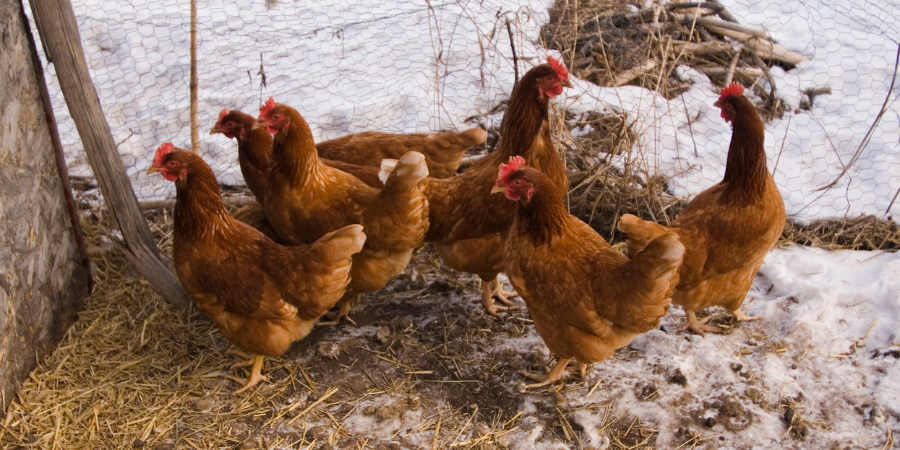
Meeting Your Chickens' Nutritional Needs in Cold Weather
Chicken care in winter requires understanding their nutritional needs and adapting their diet to the changing weather. As temperatures plummet, chickens burn more calories to maintain their internal body temperature, increasing their dietary intake. Chickens rely on a high-energy diet to generate enough heat to keep themselves warm. This means increasing the quantity of feed you offer during winter, usually by about 10% to 20% more than their usual summertime diet. Ensure their diet is rich in carbohydrates, providing quick energy that helps chickens warm up.
Poultry grit plays an integral role in a chicken's digestion process. It helps break down larger food particles in the gizzard, making nutrients more accessible. During winter, chickens may have limited access to natural sources of grit due to snow cover. It is important to provide poultry grit, which can be purchased from most feed stores, to ensure the continued proper digestion of their feed.
Scratch grains are a mixture of different seeds and grains, including corn, oats, wheat, and barley. They are considered a treat for your chickens and should only be in moderation. Scratch grains provide a source of entertainment for your flock, encouraging their natural foraging behavior. Tossing a handful of scratch grains into the coop will give your chickens an engaging activity, which is especially valuable during winter when outdoor ranging may be limited.
Keep Your Chickens Hydrated During Cold Months
Anyone raising chickens in the winter should ensure that their flock has constant access to fresh, clean water, which is vital for their survival and well-being. Chickens can not survive more than a day or two without water, and their water intake directly impacts their food consumption, egg production, and overall health. However, winter watering can be challenging due to the threat of freezing temperatures. Investing in a heated chicken waterer can be a game-changer during winter months. They come in different styles and sizes, and most have thermostats that automatically heat the water when temperatures fall below freezing.
Plastic, heated founts that plug into an outlet are a popular choice. Another option is a heated base to place a metal or hard plastic water container. Heated bases provide a steady source of heat that prevents water from freezing. A more creative solution is to repurpose heated dog dishes. These dishes are designed to keep water unfrozen for outdoor pets and can do the same for your chickens. If you use a heated dog dish, remember to cover it partially to prevent your birds from stepping into the dish or risking drowning.
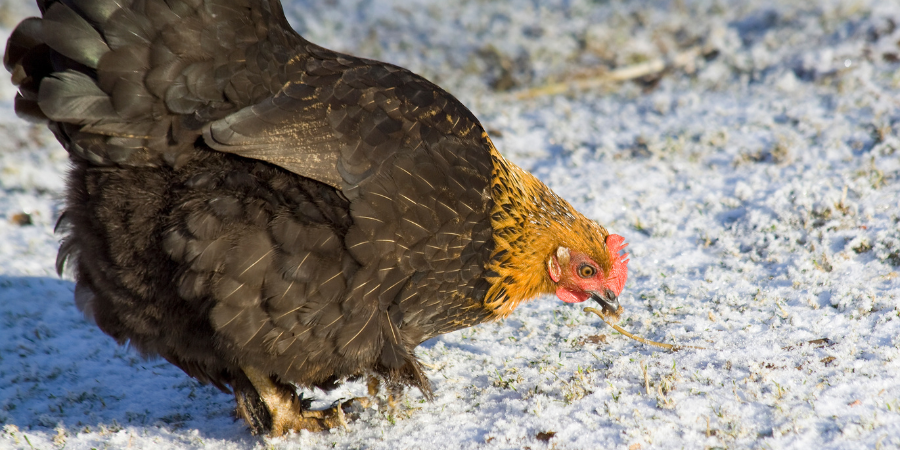
Winter Fun for Your Flock
Keeping chickens entertained during winter can be challenging, particularly if inclement weather or freezing temperatures keep them cooped up for extended periods. A stimulating environment is essential to prevent boredom, stress, and aggressive behavior among your flock. Here are several ideas to enrich your chickens' life in the winter:
Hanging Treats: A fun and engaging activity for chickens is pecking at hanging treats. One choice is a cabbage or lettuce head, which can be suspended from the coop ceiling using a sturdy string. As the chickens peck at it, the vegetable swings, providing both a mental and physical challenge.
Foraging Toys: Emulating the foraging experience inside the coop can keep chickens entertained for hours. Fill empty, sturdy plastic bottles with grains or corn, then poke holes in the sides just large enough for the grains to fall out when the bottle is moved. Your chickens will be drawn to the noise and will enjoy the challenge of knocking the grains free.
Dry Ground Cover: A covered run or a tarpaulin shelter can keep some ground dry from snow or rain. Filling this space with straw or hay can give chickens a place to scratch and peck. This dry spot can also serve as an area to hide treats or food, encouraging natural foraging behavior even in winter.
DIY Sunroom or Greenhouse Addition: A DIY sunroom or greenhouse addition can provide a warmer, brighter space for your chickens during winter. This can be made using clear plastic or polythene sheeting stretched over a simple wooden frame. The sun will heat the enclosed area, making it a warm spot for your chickens to bask. They will enjoy the change of scenery and the chance to dust bathe in the warmer environment.
Outdoor Elements: Just as in warmer months, chickens enjoy perching, roosting, and exploring. Adding elements like outdoor roosts, ladders, and leaf piles can add variety to their wintertime routines. Straw bales are also a great addition as they can act as windbreakers, provide insulation, and serve as a fun climbing and scratching post for your chickens.
Ensure Happy Hens This Winter
Raising chickens during winter may seem challenging, but it can be quite manageable with the right preparation. Remember, a well-prepared coop and slight adjustments to your flock's diet can keep them happy and healthy, even in the harshest of winters. For more details on chicken care in winter, consider downloading our free resource, The Beginner’s Guide to Homestead Chickens. You will discover that caring for backyard chickens can be similar all year round with a few slight adjustments.





